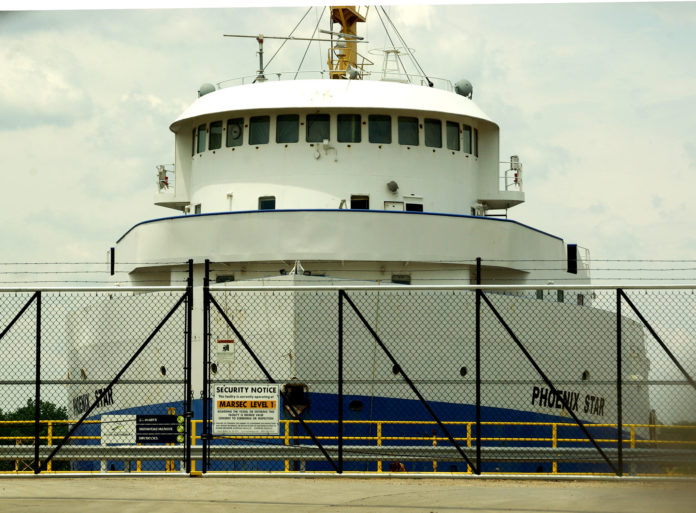
The mythical phoenix rose from the ashes of its own destruction. The Canadian lake freighter Phoenix Star will not.
Instead, the freighter’s record-breaking 45-year career will end under a scrapper’s torch in dry dock on the Maumee River. Workers at Toledo Shipyard, 2245 Front St., just downriver from the Veterans Glass City Skyway, have begun dismantling the 730-foot grain ship and expect to finish the project within 90 days, said Tony LaMantia, president of Ironhead Marine, which operates the shipyard.
The freighter was apparently the victim of an economic perfect storm, according to news reports: Inability to compete with newer, cheaper tugbarge combinations, a series of owners with financial troubles and the ship’s own condition.
Additionally, said LaMantia, the shipyard needs the dry dock which Phoenix Star occupies for its other work: inspection and repair of operating lake ships.
Phoenix Star has, since the end of the 2012 season, occupied the larger of Ironhead’s two dry docks, its wheelhouse looming over the shipyard’s main gate on Front Street. Freighter-watchers, who go by the nickname “boatnerds,” have witnessed and posted photos of the ship’s equipment being removed and holes cut in its sides.
“Basically the vessel has reached the end of its service life,” LaMantia said. Refurbishing the hull or converting the ship to a self-unloading freighter of the type that took over the Great Lakes trade in the last half of the 20th century, is not feasible, he added.
Launched in 1968 in Collingwood, Ontario, on Lake Huron’s Georgian Bay, once a major shipbuilding center on the Canadian side of the Great Lakes, the freighter sailed for decades as the Algocen, a grain carrier for Algoma Central Railway’s Marine Division.
According to www.boatnerd.com, Algocen set a number of records for grain cargoes, but also hauled other materials such as iron ore and stone.
LaMantia was reluctant to talk about the string of financial difficulties that resulted in the freighter being stranded in his dry dock, but shipwatchers online tell this story: Algocen’s four big diesel engines powered it up and down the Lakes system until 2005, when it was sold to an outfit called Recycling Technologies Inc. and traded its Canadian Maple Leaf for a Panamanian flag before being used as a storage barge in New Jersey.
Following that, it was bought by a group of investors in St. Catharines, Ontario, operating as Vanguard Shipping (Great Lakes) Ltd., renamed the J.W. Shelley and sailed back into the Great Lakes under its own power, something the shipwatchers at boatnerd.com say rarely happens.
Vanguard’s website identifies the company as “an aggressive, new company which prides itself as being the most cost-effective freight option within our market.” No one answered the phone at the number listed on the website.
But financial troubles resulted in a court-ordered sale of Vanguard’s assets to a subsidiary of a company called T.F. Warren Group — identified on its website as specializing in “Engineering, Fabrication, Erection, Repair, Maintenance, Coating and Linings to the Tank and Terminal industry.” Calls placed to the listed phone number of the company’s president, Terry Warren, in Brantford, Ontario, were not returned.
The relatively low cost and freedom from environmental regulations in some nations has resulted in many a lake boat being beached and scrapped far from home. More than a few lakers have been towed across the ocean to places like Alang, India, where miles of beaches are lined with the hulks of dead ships being cut to pieces by men with improvised cutting torches and little to no safety equipment — but considering themselves lucky to have the job. Aliaga, Turkey, is also the last port of call for tired and broken ships making their appointment with the torch.
Only recently has a combination of outcry about environmental impacts and relatively lower costs meant that some lakers meet their end in the Great Lakes. The freighter Maumee waits her turn at Port Colborne, Ontario, on the Welland Canal, and the tanker Imperial Sarnia is about half demolished. Recently, the venerable Canadian laker James Norris was scrapped at Port Colborne. Other old lakers have seen their sterns and engines cut away, their hulls converted into barges, LaMantia said.
Meanwhile, newer freighters entering Great Lakes service, such as those recently bought by Algoma and Canada Steamship Lines on the Canadian side, are built in Chinese shipyards and sailed across the ocean to the Lakes. Great Lakes shipyards on either side of the border, LaMantia said, “can’t compete with those prices.”






















